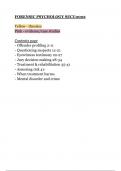FORENSIC PSYCHOLOGY SECU0002
Yellow - theories
Pink - evidence/case studies
Contents page
- Offender profiling 2-11
- Questioning suspects 12-21
- Eyewitness testimony 22-27
- Jury decision making 28-34
- Treatment & rehabilitation 35-41
- Assessing risk 41-
- When treatment harms
- Mental disorder and crime
,Week 2: Offender profiling
What is offender profiling
- Offender profiling is an investigative tool that aids the
identification, apprehension and conviction of an unknown offender
by providing the police with a description of the likely social
(employment, marital status) and mental characteristics (level of
education, motivation) of the offender. It also provides predictions
of who the offender is likely to attack next, where and when. (Saul
McLeod, 2023)
- Traditionally applied to serious crime types
- The forensic psychologist will use prior knowledge and evidence
gathered from the scene to build an offender profile.
- Profiles can include a wide range of information, depending on the
extent and type of evidence present at the crime scene. Can include
demographics, occupation, education, marital, personality traits,
residence.
- By ‘deriving an offender’s likely characteristics from the way in
which he or she committed a particular crime’
- Applied to serial offences that are judged to be linked in some way.
The clinical approach
Involves using psychological theories and methods to analyse crime
scene evidence and construct a profile of the likely offender. This
approach typically involves assessing the offender's personality
traits, motivations, and behaviours to help law enforcement narrow
down suspects or understand the type of person they are dealing
with.
,Features of a clinical profile:
- The process of drawing inferences based on clinical experience +
interpretation of the crime scene
- trying to understand the thought processes and behavioural
patterns that may lead someone to engage in criminal behaviour -
gaining insight into a person's psyche
- Features + patterns of crime are judged to provide an insight into
individual offender attributes and/or motivation, e.g.:
- Tying up victim - indicates a need for control
- Targeting prostitutes implies a hatred toward women
- Clinical profilers usually have a psychology background. They
draw on clinical experiences + expertise - e.g. gained in forensic
mental health settings
General process of clinical profiling:
- Collate available inf0 - Victim background such as
demographics, lifestyle, and relationships, to understand potential
motives and patterns. Offender behaviour such as the method of
entry, the type of violence used, and any evidence of planning or
disorganisation.
- Identify crime type - murder, rape
- Identify character of crime - Profilers look for any elements of
the crime that go beyond the necessary steps to commit the offence,
known as the signature. This can include ritualistic behaviours,
symbolic acts, or excessive violence that reveal the offender's
psychological motives and fantasies. Also consider whether the
victim was targeted specifically or chosen randomly.
- Understanding what happened - Crime Scene reconstruction:
Profilers reconstruct the sequence of events leading up to and
following the crime, based on evidence collected at the scene and
behavioural analysis. Timeline Development: including the actions
of both the offender and the victim, to understand the dynamics of
the interaction.
, - Psychodynamic theories - applied to understand the
underlying psychological motives of the offender, use behavioural
theories to interpret the offender's actions and decisions (level of
impulsivity, planning, or aggression), and profilers may classify
offenders into different typologies based on psychological
characteristics, such as organised versus disorganised offenders, or
serial killers versus spree killers.
Example:
- Jack the Ripper
- Serial killer active in 1888 in London
- He would strangle his victims first into unconsciousness and then,
when they lay on the ground, he performed his ritual of mutilation.
This suggests a killer who wants to dominate his victim with power
and sexual violence
- severe post-mortem injuries of a sexual nature, including the
removal of the victim's uterus. Believed this to indicate ‘rage’ and
‘hatred of women’
- The clinical approach proved to be unsuccessful as the true
identity of Jack the Ripper was never uncovered.
Limitations:
- Rarely used nowadays
- More focused on psychological assessment and understanding the
offender's motivations and behaviour from a psychiatric or
psychological perspective. Clinical profilers may conduct in-depth
interviews and psychological evaluations of suspects to assess their
mental state, personality traits, and potential risk factors for
criminal behaviour. However these psychological theories may not
accurately predict criminal behaviour, and there is limited research
demonstrating the effectiveness of profiling techniques in solving
crimes.
- Subjectivity and bias: profiling judgments may be based more on
intuition or stereotypes than on objective evidence.




